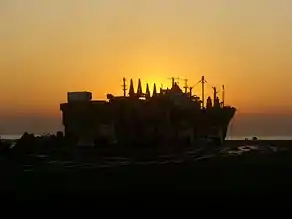Chittagong Ship Breaking Yard
Chittagong Ship Breaking Yard is located in Faujdarhat, Sitakunda Upazila, Bangladesh along the 18 kilometres (11 mi) Sitakunda coastal strip, 20 kilometres (12 mi) north-west of Chittagong.[1] Handling about a fifth of the world's total, it is the world's largest ship breaking yard, employs over 200,000 Bangladeshis, and accounts for around one-half of all the steel in Bangladesh.[2]

History
.JPG.webp)

In 1960, after a severe cyclone, the Greek ship M D Alpine was stranded on the shores of Sitakunda, Chittagong. It could not be re-floated and so remained there for several years. In 1965, Chittagong Steel House bought the ship and had it scrapped. It took years to scrap the vessel, but the work gave birth to the industry in Bangladesh.
During the Bangladesh Liberation War, a Pakistani ship Al Abbas was damaged by bombing. Later on, the ship was salvaged by a Soviet team who were working at Chittagong port at the time and the ship was brought to the Faujdarhat seashore. A local company, Karnafully Metal Works Ltd bought it as scrap in 1974 and introduced commercial ship breaking in the country.[3]
The industry grew steadily through the 1980s and, by the middle of the 1990s, the country ranked number two in the world by tonnage scrapped. In 2008, there were 26 ship breaking yards in the area, and in 2009 there were 40.[4] From 2004 to 2008, the area was the largest ship-breaking yard in the world. However, by 2012 it had dropped from half to a fifth of worldwide ship-breaking.[2]
At one stage the industry was a tourist attraction, but outsiders are no longer welcome due to its poor safety record;[5] a local watchdog group claims that one worker dies a week and one is injured a day on average.[6]
Workers have neither protective equipment nor financial security.[7] In 2014, shipping company Hapag-Lloyd followed an earlier decision by Maersk to stop using the yard for breaking its old ships, despite the higher costs elsewhere.[8]
A scene of the movie Avengers: Age of Ultron was shot at the ship breaking yards of Chittagong.[9]
Gallery
 Jafrabad Chittagong shipbreaking
Jafrabad Chittagong shipbreaking.JPG.webp) Jafrabad Chittagong shipbreaking
Jafrabad Chittagong shipbreaking.JPG.webp) Jafrabad Chittagong shipbreaking
Jafrabad Chittagong shipbreaking.JPG.webp) Jafrabad Chittagong shipbreaking
Jafrabad Chittagong shipbreaking.JPG.webp) Jafrabad Chittagong shipbreaking
Jafrabad Chittagong shipbreaking.JPG.webp) Jafrabad Chittagong shipbreaking
Jafrabad Chittagong shipbreaking.JPG.webp) Jafrabad Chittagong shipbreaking
Jafrabad Chittagong shipbreaking.JPG.webp) Jafrabad Chittagong shipbreaking
Jafrabad Chittagong shipbreaking Ship breaking in Sitakunda
Ship breaking in Sitakunda Shipbreaking Yard Bhatiari, Sitakunda
Shipbreaking Yard Bhatiari, Sitakunda Idolhunter
Idolhunter
References
- "Chittagong Ship Breaking Yard, Bangladesh". Scrapshipbreaking.com. Archived from the original on 1 February 2012.
- "Ship breaking in Bangladesh: Hard to break up". The Economist. 27 October 2012. Retrieved 15 May 2013.
- "Overview of Ship breaking in Bangladesh". Young Power in Social Action.
- Sarraf, Maria; Steur-Lauridsen, Frank; Dyoulgerov, Milen; Bloch, Robin; Wingfield, Susan; Watkinson, Roy. "Ship Breaking and Recycling Industry in Bangladesh and Pakistan" (PDF). World Bank. p. 30. Retrieved 6 October 2012.
- Gwin, Peter (May 2014). "The Ship-Breakers". National Geographic. Retrieved 25 May 2014.
- Vidal, John (5 May 2012). "Bangladeshi workers risk lives in shipbreaking yards". The Guardian. Retrieved 16 March 2014.
- "Workers in Shipbreaking Industries: A Base Line Survey of Chittagong (Bangladesh)" (PDF). Young Power in Social Action. 2005. p. 15. ISBN 984-32-2024-2.
- Evans, Stephen (1 September 2014). "How do you safely break up an 'old lady'?". BBC News. Retrieved 1 September 2014.
- Conaway, Cameron (29 October 2014). "The State of Our World in a 1-Second Clip". Huffington Post. Retrieved 23 February 2015.
External links
| Wikimedia Commons has media related to Chittagong Ship Breaking Yard. |
| External video | |
|---|---|
- Hossain, Kh. Akhter; Iqbal, K. Shahriar; Zakaria, N. M. Golam. "Ship Recycling Prospects in Bangladesh" (PDF). Proceedings of MARTEC 2010: 297–302. Archived from the original (PDF) on 13 April 2014.
- "Images of shipbreaking at Chittagong". Кладбище кораблей (Graveyard of ships) (in Russian). Archived from the original on 23 April 2014. Retrieved 25 May 2014.